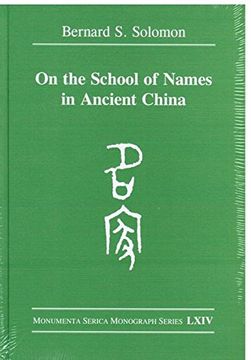Share
On the School of Names in Ancient China (Monumenta Serica Monograph Series)
Bernard S Solomon (Author)
·
Routledge
· Hardcover
On the School of Names in Ancient China (Monumenta Serica Monograph Series) - Bernard S Solomon
£ 117.00
£ 130.00
You save: £ 13.00
Choose the list to add your product or create one New List
✓ Product added successfully to the Wishlist.
Go to My WishlistsIt will be shipped from our warehouse between
Friday, July 26 and
Tuesday, July 30.
You will receive it anywhere in United Kingdom between 1 and 3 business days after shipment.
Synopsis "On the School of Names in Ancient China (Monumenta Serica Monograph Series)"
The present study on ancient Chinese philosophy invites us to meet a challenging task in philosophical understanding. The so-called "School of Names" (mingjia 名家) is a label for a diverse group of thinkers in the Warring States period (479–221 B.C.) that has sometimes been accused of dabbling in flippant linguistic and conceptual puzzles, paradoxes, or sophistries. Bernard Solomon analyzes the works of its two main representatives, namely Huizi 惠子 (Master Hui, or Hui Shi 惠施, 380–305 B.C.?) and Gongsun Long 公孫龍 (b. 380 B.C.?). The Chapter One deals with the ten "paradoxes" of Huizi as recorded in the Zhuangzi 莊子. Chapters Two to Six are devoted to five texts attributed to Gongsun Long that have been called cryptic or even a mixture of banality and nonsense. Among them is also found the "White-Horse Dialogue" with its famous dictum "A white horse is not a horse." The aim of Solomon’s investigation is the discovery of the rules of "language games" in the School of Names and of the key to solve their linguistic and conceptual puzzles and paradoxes. His analysis shows in all the texts he interprets an "evidence of an interest in language qua language" (p. 12), which is unique for Chinese thought in the classical era. Bernard S. Solomon holds a Ph.D. in Far Eastern Languages of Harvard University (1952) and was a long-time Professor of Chinese in the Department of Classical and Oriental Languages at Queens College, City University of New York (CUNY).
- 0% (0)
- 0% (0)
- 0% (0)
- 0% (0)
- 0% (0)
All books in our catalog are Original.
The book is written in English.
The binding of this edition is Hardcover.
✓ Producto agregado correctamente al carro, Ir a Pagar.

